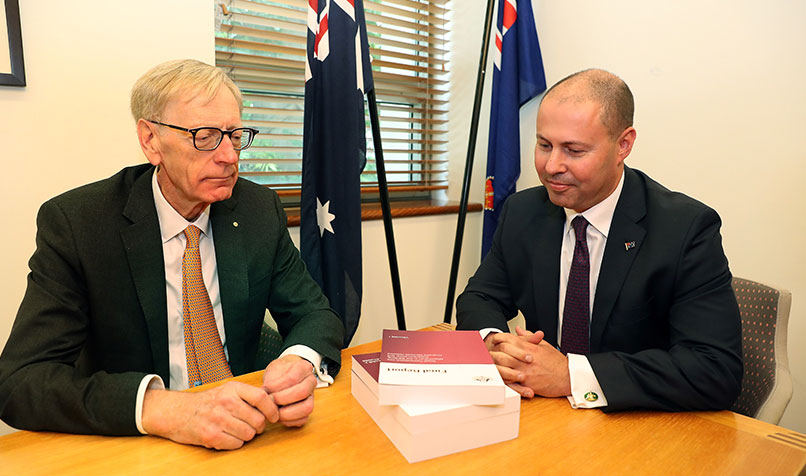Loading component...
At a glance
- Australia’s financial services industry is in the midst of a long period of transition, and will remain so with the introduction of increasingly complex regulation and compliance obligations.
- The financial advice sphere has been especially hard-hit, reporting a rising attrition rate.
- There is a growing need for affordable financial advice, causing an advice gap that industry players hope will be addressed by a reduction in red tape and an increase in the industry’s capacity to assist clients in need of “episodic advice”.
By Gary Anders
Australia’s financial services industry is used to unexpected changes and challenges. It goes with the territory of facilitating and managing the financial interests of millions of individual consumers and businesses.
However, the road ahead is arguably more uncertain and difficult than ever, as different industry participants grapple with increasingly complex regulations and greater compliance obligations.
The whole financial services industry has been in a state of flux for some time now, and major industry changes are still looming.
Those changes will continue to dictate the path forward for financial institutions and have far-reaching implications for accounting practitioners, financial advisers, mortgage brokers and other industry participants.
The post-Royal Commission wave

It has been two years since the release of the final report from the Royal Commission into Misconduct in the Banking, Superannuation and Financial Services Industry, delivered by presiding Commissioner Kenneth Hayne.
After receiving more than 10,000 submissions and conducting months of public hearings, the Royal Commission’s 530-page report contained 76 recommendations.
Many of these were related to strengthening consumer protection laws following serious misconduct breaches by banks, financial advisers and others that came to light during the hearings.
In addition to leading to a swag of civil prosecutions, director resignations and the imposition of large fines against Australia’s major banks and other financial institutions, the Royal Commission has precipitated a raft of new financial legislation.
In November 2019, the federal government announced a package of legislation to address 20 recommendations from the Royal Commission designed to strengthen consumer protections across the superannuation and insurance sectors.
Among them are reforms allowing provisions for financial services industry codes to be enforceable, with breaches attracting civil penalties, ensuring better adherence by industry and certainty for consumers.
There has already been a huge shakeout in the financial advice sector over the past two years, with the country’s biggest banks having either sold or downsized their advice operations.
This includes National Australia Bank’s A$1.44 billion sale of MLC last year to IOOF, and Commonwealth Bank’s recent sale of Colonial First State to US private equity firm KKR. ANZ and Westpac have also significantly downsized their wealth advice operations.
These moves have placed further strain on financial advice resources at a time when the number of licensed advisers choosing to leave the industry permanently is accelerating.
Banks also have been actively implementing operating changes as a priority in response to certain consumer protection recommendations.
Strengthening in regulators

Central to the Royal Commission’s report were recommendations for the federal government to strengthen the powers of Australia’s primary financial regulators, the Australian Securities and Investments Commission (ASIC) and the Australian Prudential Regulation Authority (APRA).
Hundreds of prosecutions have taken place over the past 24 months, including the cancellation of scores of financial service licences, company liquidations and, in some cases, imprisonment.
Regulators have also received substantial funding increases to bolster compliance monitoring resources and to maintain the integrity of the financial system.
In December 2020, the federal government announced the closure of the Financial Adviser Standards and Ethics Authority (FASEA), streamlining the number of bodies involved in the oversight of financial advisers.
FASEA’s standard-setting functions will be moved to Treasury, and the remaining elements of the agency’s role, including administering the adviser educational exams, may be incorporated into the expanded mandate of the Financial Services and Credit Panel (FSCP) under ASIC.
The government also enacted legislation stemming from the Royal Commission that requires advisers to disclose if they are legally independent and that allows one-off advice fees to be deducted from MySuper accounts.
Meanwhile, APRA has called for changes to guidelines that would require banks and other institutions to hold more capital on their balance sheets to protect against unexpected shocks such as COVID-19.
That could ultimately squeeze the availability of finance from conventional lenders, but in turn drive more business to second-tier lenders.
This is a balancing act, especially in the context that lenders were encouraged to be more lenient with borrowers during 2020 to support government efforts to stabilise the economy.
“So far, APRA-regulated entities have responded well to the impacts of COVID-19, and Australia’s financial system remains in sound shape,” says Renee Roberts, APRA’s executive director, policy and advice. “But other challenges, many structural and long term, remain in play.
“Although it is ultimately up to boards to guide their companies successfully through turbulent times, APRA also has a role to play in making sure bank depositors, insurance policyholders and super members are protected.
“With our policy agenda now out of the COVID-19-related deep freeze, we are once again focused on strengthening the prudential framework to bolster entity resilience.”
The compliance burden increases
An increasing concern across the accounting and financial advice sectors, however, is the rise in regulatory red tape and the associated costs that come with it.
That concern has not abated since the release of CPA Australia’s Regulatory Burden Report in October 2019, which pointed to the need to eliminate duplicative and conflicting regulations, and to streamline the existing framework to reduce the cost and burden on professional accountants.
Andrew Albury FCPA, director of Brisbane-based MGD Wealth, says the financial advice industry is suffering as a result of the increased compliance obligations that have been thrust upon it since the Royal Commission.
In addition to having to dedicate a senior company resource to manage its compliance, diverting it from bringing in revenue, Albury says the demands on advisers have increased to the point where many are questioning whether they want to remain in the industry.
"Good-quality, affordable financial advice may help consumers make better financial decisions, especially during times of heightened vulnerability."
“It is overwhelming,” Albury says. “The fear I have for the industry at the moment is that it is so overwhelming that people can’t see past it anymore. The red tape, the regulatory expectations, the stuff you’ve got to do, it’s just enormously overwhelming.
“The regulatory world, and the paperwork, and the compliance manuals that we have to go through – it is mind-boggling.”
Albury says some of his staff are questioning whether they are in the right industry.
“I understand it from my point of view, and those a bit older, that we’re fatigued by it. And we can probably hang out for a few more years and then we’re done,” he says.
“But you’ve got some young up-and-comers in the industry who are questioning whether it’s too hard, even though they’re just employees.”
A rising attrition rate
Mark Hoven, CEO of financial advice data and ratings agency Adviser Ratings, agrees that cutting regulatory compliance is paramount.

“We’re still looking at another 5000 advisers who are likely to leave the industry in the next year or so,” he says, which would cut the total licensed adviser population from 21,000 down to 16,000.
While Hoven says the number of new financial adviser licences being created has been consistent, typically the majority of new boutique firms (with one to three advisers) are shutting down within five years, primarily for cost reasons.
“Over the last two years, we’ve seen an inexorable increase in the number of licensees being shut down. Almost two and a half are shutting down to every one being formed.”
That comes at a time when ASIC is consulting with financial industry participants to explore what steps can be taken to improve consumer access to quality “limited advice”. Under ASIC’s definition, limited advice is personal advice that does not cover all areas that are relevant to a client.
“Good-quality, affordable personal advice may help consumers make better financial decisions, especially during times of heightened vulnerability,” says Danielle Press, ASIC commissioner.
As a follow-up to the Regulatory Burden Report, CPA Australia released The Value of Advice Report in late 2020, noting the ever-changing regulatory framework around the provision of professional advisory services is resulting in a rising compliance burden for advisers.
The report includes ground-breaking modelling on the economic impact of professional advice for the entire Australian population.
Using 2019 Australian GDP data, it has calculated that, if every Australian were able to access properly implemented professional advice, the potential economic boost would be equivalent to A$24,716 per person per year, or an aggregate annual contribution equivalent to A$630.26 billion.
The government says the decision to wind up FASEA and move its functions to Treasury and ASIC is all part of the effort to cut red tape and make financial advice more affordable and accessible to more people.
However, it appears many industry participants are still not convinced.
Filling the gap
All current advisers have until 1 January 2022 to pass what used to be the FASEA exam in order to provide personal financial advice to retail clients in respect of retail financial products.
However, even though a high proportion of advisers have already passed the exam, Hoven says many have indicated they are intending to leave the industry.
This industry knowledge drain is occurring at a time when public demand for professional financial advice is increasing, especially from Australians in or nearing retirement.
The challenge for the whole financial services industry is to ensure Australians’ access to quality, affordable advice is not unduly impeded.
Albury says the big banks leaving the industry is both good and bad.
“From our point of view, we’ve always been a little bit cynical about the quality of advice coming out of the institutional world versus our independent world. But it’s harder for smaller firms to offer basic advice because of the high cost,” says Albury.
“This should be all about helping the people who really do need the advice. But the people who need the advice can’t really afford it.”
Hoven says the federal government’s decision to allow accountants and tax agents to deliver limited advice during the COVID-19 outbreak in relation to early access to super was a very significant and positive move.
“While that was always said to be temporary, I believe it does flag where the government’s trying to go, which is to improve capacity in the industry and increase volume.
“This will make it easier for accountants and tax agents to help people in very narrow and tightly defined areas like early access to super.”
Fund managers, including superannuation funds, and stockbrokers are also likely to step in to fill some of the void by providing limited advice.
“It really leads into this big push at the moment to reduce red tape in the advice industry and to increase the capacity for the industry to handle consumers who need ‘simple help’, ‘limited advice’, ‘scaled advice’, ‘modular’, ‘episodic advice’ – it’s got all these different names, but it means ‘not providing comprehensive advice’,” Hoven says.
“Reducing the red tape, limiting the amount of documentation required, tightly defining the areas where assistance can be provided – in many cases it’s acknowledging there’s a lot of assistance and financial help than can be provided, which is upstream of a statement of advice.”

